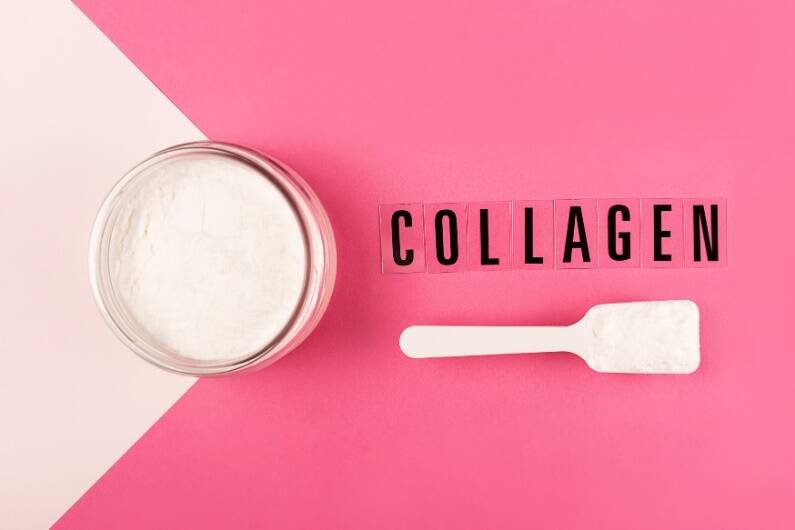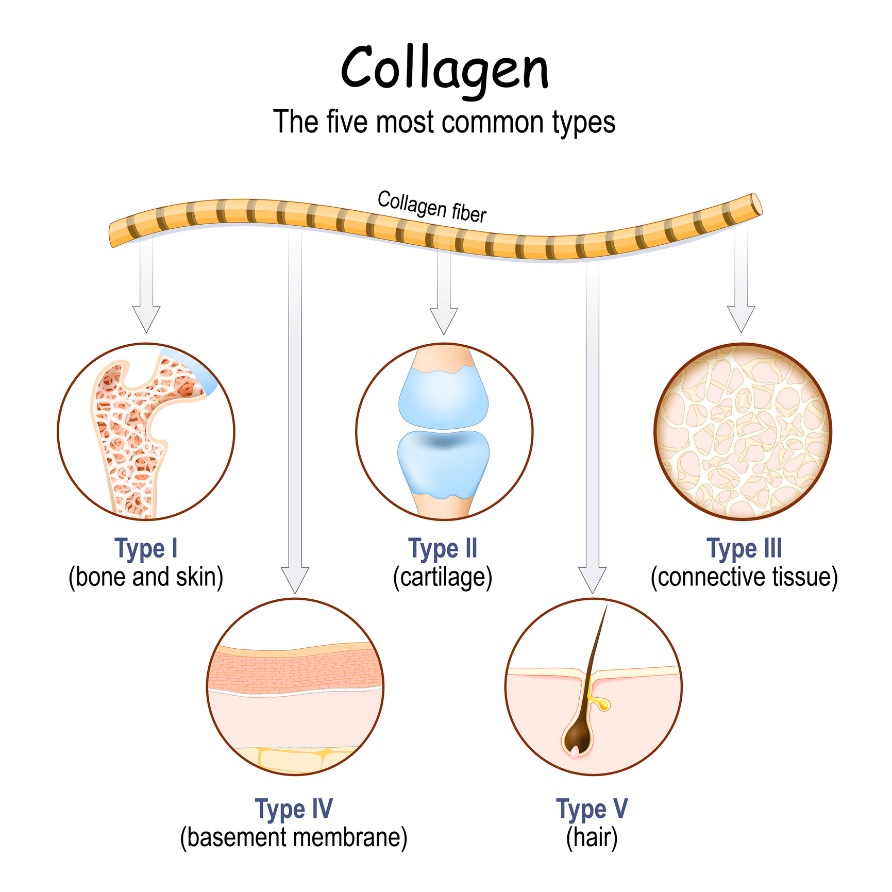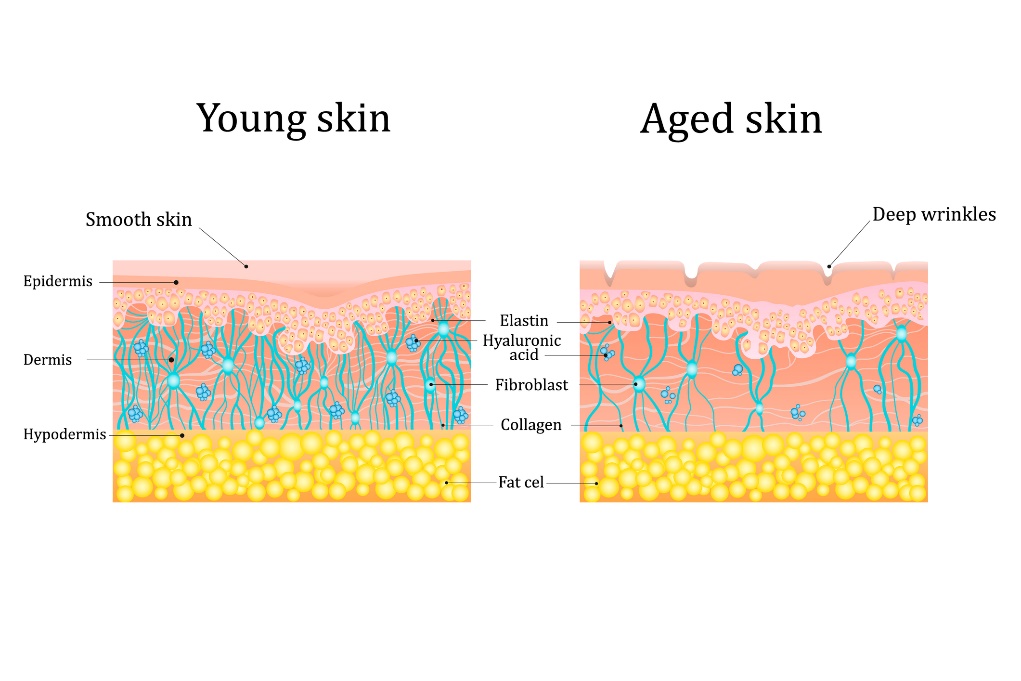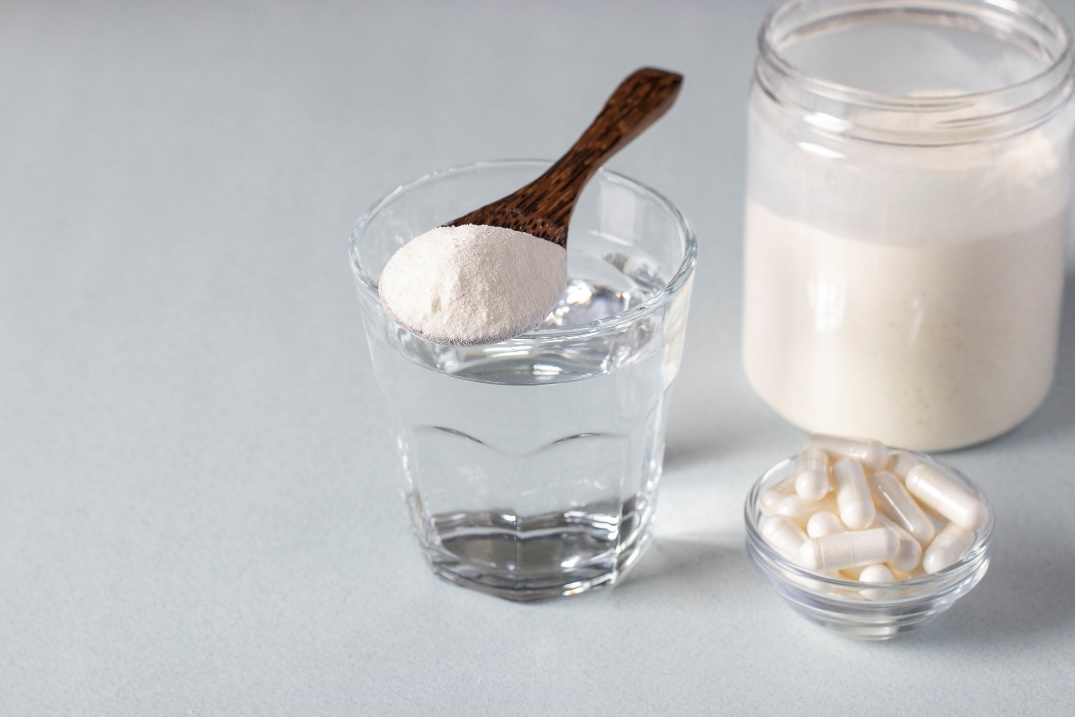- solen.cz - New ways to improve skin quality. Solen. MUDr. Kateřina Klauzová
- solen.cz - Natural substances in dietary supplements and their role in osteoarthritis. Solen. PharmDr. Richard Richter, CSc.
- healthline.com - What Is Collagen, and What Is It Good For? Healthline. Kathy W. Warwick, R.D., CDE
- medicalnewstoday.com - What is collagen, and why do people use it? MedicalNewsToday. James McIntosh
- healthline.com - 13 Foods That Help Your Body Produce Collagen. Healthline. Sarah Garone
Collagen in dietary supplements. Its functions and effects. Does it really work?

Collagen is currently an over-promoted product and dietary supplement for improving the quality of skin, hair and joints. What exactly is collagen and what effects does it have on the human body?
Article content
How is collagen produced and how can it be increased?
Are dietary supplements effective?
All this and much more interesting information can be found in the article.
What is collagen?
Collagen is one of the basic building proteins in the human body.
This extracellular, water-insoluble protein is particularly important in the human body for the health and strength of the musculoskeletal system (cartilage, bones, muscles, tendons), the quality of skin, nails and hair.
It is an indispensable component of all connective tissues of the human body.
A specific collagen molecule consists of up to 19 amino acids (glycine, proline, lysine, arginine...).
In the human body, collagen makes up approximately 80% of the skin and 70% of the dry weight of articular cartilage. It makes up approximately 10% of a person's total weight.
Collagen has up to 27 different types. Type I collagen accounts for 90% of all collagens found in the human body. The next most abundant are type II and III collagens.
Type I collagen.
This is the most abundant type of collagen in the human body.
It is mainly found in the skin, hair, nails, musculoskeletal system and connective tissues. Its levels begin to decline around the age of 25. Type I collagen fibres are excessively strong and stiff.
It is often associated with beauty and a slower aging process. It is also important for the musculoskeletal system because it is found in large amounts in bones, muscles, tendons and cartilage.
Type II collagen.
This type of collagen is found in joint structures and makes up approximately 70% of articular cartilage. It is very important for the musculoskeletal system of the body.
It forms dense spatial networks of thin fibres that nourish and stabilise cartilage and ensure its resistance to impact.
Collagen type III.
This type is found mainly in connective tissue (bone marrow, spleen, liver), vascular walls, muscles and organs.
Type IV collagen.
It forms the basement membrane and the extracellular matrix, abbreviated ECM. The ECM nourishes the skin cells and also provides them with external support.
Collagen V.
It is found in the bone matrix, in the cornea of the eye and in connective tissue. It is also abundant in hair cells.

Formation of collagen in the body
The ability to form collagen changes gradually during life and decreases with age. Internal and external factors determine collagen synthesis.
From approximately 25 years of age, the body's production of collagen decreases by up to 1-1.5% per year.
Collagen consists of amino acids. When a protein-rich diet is consumed, the digestive tract breaks down the food into amino acids, which are then used to produce collagen.
A sufficient intake of vitamin C is important for collagen synthesis.
Vitamin C is important for both collagen formation and hyaluronic acid synthesis.
Collagen deficiency is mainly manifested by dryness and sagging of the skin, joint pain, cartilage shrinkage, wrinkles, reduced quality of nails and hair and other physical symptoms.
Factors impairing collagen production:
- Older age
- Excessive exposure to stress
- Autoimmune diseases (lupus, rheumatoid arthritis...)
- Lack of necessary vitamins (especially vitamin C)
- Insufficient protein intake in the diet
- Excessive exposure to UV radiation
- Smoking tobacco products
- Consumption of alcohol
- Excessive consumption of simple sugar
- Lack of sleep and body regeneration
Collagen can be ingested in the diet quite easily as it is a component of many staple foods.
Important sources in the diet to support collagen production:
- Bone and meat broth
- Meat (chicken, beef, pork)
- Gelatin
- Fish and seafood (salmon)
- Eggs
- Green vegetables (broccoli, kale)
- Avocados
- Peppers, tomatoes, carrots
- Beans
- Garlic, onions
- Nuts and seeds (cashews, pumpkin)
- Citrus and berries
Functions and effects of collagen in the body
The protein collagen has a high representation among all proteins in the body. Its main role is to support skin health and the function of the musculoskeletal system - cartilage, tendons, muscles and bones.
In addition to muscle growth and bone density, it is involved in the healing process of the apparatus after injuries or surgeries.
Collagen slows down skin aging, wrinkle formation and improves healing after skin cover injuries (traumas, scars, burns...).
Effects of collagen in the human body:
- Supporting joint function
- Supporting muscle growth and building
- Nourishment of cartilage and joint structures
- Slowing bone thinning
- Healing of the musculoskeletal system
- Slowing the aging process
- Promoting healing of skin injuries
- Revitalization of skin, hair and nails
- Tissue regeneration
- Supporting the cardiovascular system
- Support the digestive tract

Collagen and dietary supplements
The dietary supplement market today offers a plethora of collagens. Buyers can choose from a variety of brands, types and forms of use (water-soluble powder, orally in tablets or even in gel form for consumption).
However, the question is how the digestive tract processes the ingested collagen and how it is subsequently used by the body.
What happens to collagen after it is ingested?
Collagen is a protein. The body enzymatically breaks down each ingested protein into the individual amino acids that make it up.
The processed molecules can then pass through the intestinal tract, through the intestinal wall, into the vasculature and the target site. In the target organs, the amino acids form a specific protein.
Collagen as such is a large molecule that cannot be absorbed by the human digestive tract. Therefore, hydrolysed collagen has been created that is already pre-digested into individual amino acids. The body thus absorbs the amino acids directly.
According to the experts, however, the digestive tract does not recognise that the original collagen was collagen. It therefore treats the amino acids it has taken in as it needs them at the time.
If the body currently has enough collagen, it can make a protein other than collagen from the amino acids it has taken in.
If collagen protein is formed from the amino acids ingested, the body can transport the collagen to "places more important to the body" than the skin.
Examples are the musculoskeletal system (cartilage, tendons...), connective tissues, vascular walls, etc. If the body sends collagen to the skin, it should not be forgotten that the skin is the largest organ in the body. It weighs even 10 kg.
Therefore, collagen supplementation does not necessarily translate into an increase in collagen in the skin, as the marketing of nutritional products promises.
Currently, studies have not shown that collagen has any negative effect on health.
Studies report that taking collagen increases the body's protein intake.
What to take away from the above?
The use of hydrolysed collagen (broken down into amino acids) in dietary supplements has not been shown to have a detrimental effect on health. On the contrary, it is beneficial to the body because the body receives increased amounts of amino acids/proteins through this supplement.
Dietary supplements have a positive effect on the condition of the joints, muscles, organs, connective tissues, skin and hair. However, it should be noted that the amino acids taken in will form not only collagen protein in the digestive tract, but also various proteins with different functions.
Also, collagen is distributed to various target sites that the body evaluates as more important than, for example, an unwanted wrinkle on the forehead.
Most often, however, users of collagen report an improvement in health. This is related precisely to the higher intake of protein (the basic building blocks of the body).
How to choose the right dietary supplement with collagen?
Manufacturers of collagen supplements recommend that users choose a collagen that targets the desired site of action. For example, if you are focusing on joint pain relief and cartilage nutrition, it is advisable to reach for a supplement with type II collagen.
If, on the other hand, you're focused on eliminating aging and supporting skin health, manufacturers say you should reach for a supplement with as much type I collagen as possible.
In general, it is advisable to choose a product that contains vitamin C for better absorption and synthesis of collagen. Alternatively, take the vitamin together with collagen as part of a nutritional treatment.
It is also advisable that the product does not contain sugar, artificial sweeteners or other flavourings and is as 'pure' as possible.
What type of collagen supplement should I choose?
As in food, the collagen in a dietary supplement is derived from chicken, beef, pork or fish (marine) tissues.
Pork and beef collagen is obtained from cows or pigs. It contains mainly collagens types I and III. These types are important for the health and strength of bones, tendons, ligaments and skin.
Chicken collagen contains mainly type II collagen, which is best suited for the nourishment of cartilage and joint structures. It is therefore a suitable supplement to support joint health. In addition to collagen, chicken cartilage extract also contains chondroitin, which is a building block of human cartilage.
Marine collagen derived from marine fish is relatively easy to absorb and contains mainly type I collagen. It is mainly derived from the skin, bones, fins or scales of marine fish.
Unlike beef collagen, fish collagen is composed almost exclusively of type I collagen.

Interesting resources
Related










